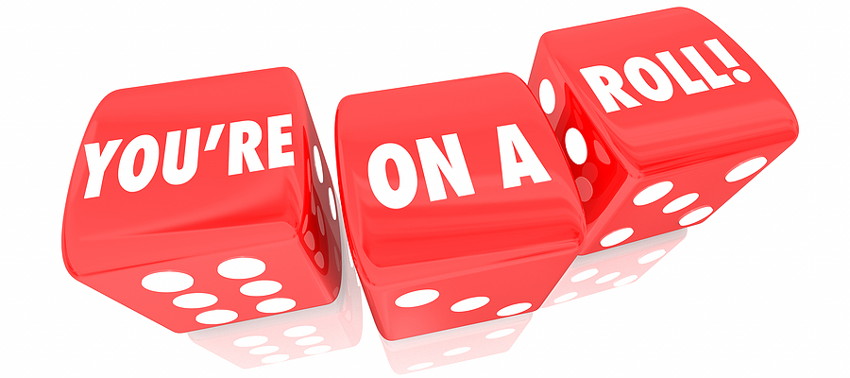 How many of us have felt as though we’ve been on a winning streak when placing bets and that this meant that we ‘couldn’t lose’? In essence, that is the hot hand fallacy summed up in one sentence. It is the conviction that success achieved once indicates the likelihood of further success in the future. It originates from the world of basketball, in which it is thought that a shooter scoring once will be more likely to score on the next shot.
How many of us have felt as though we’ve been on a winning streak when placing bets and that this meant that we ‘couldn’t lose’? In essence, that is the hot hand fallacy summed up in one sentence. It is the conviction that success achieved once indicates the likelihood of further success in the future. It originates from the world of basketball, in which it is thought that a shooter scoring once will be more likely to score on the next shot.
This can lead to bettors making mistakes when lining up their wagers, as though the very fact that they won the previous bet they placed means it’s as good as guaranteed that they’ll win their next one. This, in turn, can lead to more experimental bets, especially if the previous such wager was a successful one. It’s not just their own ‘hot hand’ that bettors can believe in, with the ‘hot hand’ of a player also likely to influence betting decisions.
Hot Hand Fallacy Explained

Imagine a world in which you have tossed an equal and fair coin ten times and guessed whether it would come up correctly each time. You might well perceive that you have a greater than 50% chance of guessing whether it will be heads or tails when you next toss the coin. This would be incorrect thinking, given that statistically the chance of it landing on one or the other is literally 50% and you do not have an ability to divine anything.
This is, in essence, the hot hand fallacy. It is the belief that a modicum of success at something means that someone is in something of a run of form and will be able to carry on repeating the action. Just because you’ve guessed correctly ten times in a row, there is nothing that suggests that you’ll be able to correctly guess the landing of the coin the next time you toss it and the belief that there is is a fallacy.
The Hot Hand Fallacy In Sports
 The idea behind the hot hand fallacy came out of the world of basketball. Whether you talk to players, coaches or fans of the sport, virtually everyone involved in basketball believes in the idea of a player ‘being on fire’ from time to time. They might refer to as being ‘in the rhythm’ or ‘in the zone’, but the meaning remains the same: the player can do virtually no wrong and their ability to shoot a basketball is better than normal.
The idea behind the hot hand fallacy came out of the world of basketball. Whether you talk to players, coaches or fans of the sport, virtually everyone involved in basketball believes in the idea of a player ‘being on fire’ from time to time. They might refer to as being ‘in the rhythm’ or ‘in the zone’, but the meaning remains the same: the player can do virtually no wrong and their ability to shoot a basketball is better than normal.
There’s no question that the idea of a ‘hot hand’ makes sense from a sporting point of view. Any person involved in sports will have had a moment when they have felt that momentum is on their side and that they can do no wrong with a golf club or every shot they take when playing pool will go in a pocket. In reality, it’s not because you’ve got a ‘hot hand’ but is happening for some other reason, such as you being more focussed than normal.
The truth is that human beings are predisposed to look for patterns where none exist. Shooting data, whether it be in basketball or football or some other sport that you enjoy, is largely random. Some players are better than others, but they are not necessarily better than a different version of themselves depending on whether they’re in the middle of a ‘hot hand’ episode or not. That simply isn’t the way it works.
Three psychologists named Thomas Gilovich, Robert Vallone and Amos Tversky wrote a paper in 1985 entitled ‘The hot hand in basketball: On the misperception of random sequences’. In it they discovered that looking at shooting stats for basketball players showed that the number of times that they either made or missed a shot was the same as what they’d expect to see from the flipping of a coin in terms of randomness.
The psychologists believed that the idea of a player having a ‘hot hand’ was nonsense, which incensed basketball players and coaches. Red Auerbach, the one-time coach of the Boston Celtics, said that he ‘couldn’t care less’ that someone had made a study. Some scientists disagreed too, but when the three men successfully defended their idea against their critics the idea of the hot hand fallacy became a reality.
Hot Hand Fallacy In Betting
 Bettors always look for patterns. It is a natural instinct from people that wish to find a way of ‘beating’ the bookmakers and casinos to try to find some small chink in the armour of their adversaries in order to win as much money as possible. This is why the gambler’s fallacy came into being, with bettors convinced that if one outcome has had a run then a change in fortune was definitely due to happen.
Bettors always look for patterns. It is a natural instinct from people that wish to find a way of ‘beating’ the bookmakers and casinos to try to find some small chink in the armour of their adversaries in order to win as much money as possible. This is why the gambler’s fallacy came into being, with bettors convinced that if one outcome has had a run then a change in fortune was definitely due to happen.
The most obvious example of this is in roulette, where punters will bet on black if the ball has come up red ten times in a row, in spite of the fact that there is just as much chance of it coming up red as black every time the ball is spun. The difference between the two idea is that the gambler’s fallacy expects a certain run to end, whilst the hot hand fallacy expects the run to continue, in spite of any evidence to the contrary.
The reason the hot hand fallacy is so seductive to bettors is that they feel as though they have some control over an outcome. Whereas the result of a roulette wheel spinning and the ball landing is down to the croupier, the ‘ability’ to make a successful guess and keep on doing something lies in the hands of the person doing the guessing. It is not possible to predict something truly random, yet the victim of the hot hand fallacy believes they’re doing so.
For bettors, the desire to continue betting after having won a bet that they’ve placed is common. Whilst it is true that some people do indeed win again after having won the previous time, this is not because of a ‘hot hand’. Instead, research suggests that winning bettors are more likely to bet on something with lower odds when they place their next wager, effectively playing it safe rather than taking risks.
Players With A ‘Hot Hand’
 It’s not just themselves that bettors can consider to have a ‘hot hand’. It’s not uncommon for players to hit something of a run of form, which bettors can then latch on to and attempt to win bets themselves. During Leicester City’s run to the Premier League title in the 2015-2016 season, for example, their striker, Jamie Vardy, scored in 11 consecutive matches. This set a new record, breaking the one set by Ruud van Nistelrooy.
It’s not just themselves that bettors can consider to have a ‘hot hand’. It’s not uncommon for players to hit something of a run of form, which bettors can then latch on to and attempt to win bets themselves. During Leicester City’s run to the Premier League title in the 2015-2016 season, for example, their striker, Jamie Vardy, scored in 11 consecutive matches. This set a new record, breaking the one set by Ruud van Nistelrooy.
Though it wouldn’t be true to say that he had ‘hot hand’ given the fact that Leicester as a team were playing so well that season, it’s certainly the case that he was in a good run of form, but he ended the campaign as the runner-up in the Premier League’s Top Goalscorer charts, netting 19 times. Bettors who latched on to Vardy’s ‘hot hand’ will have been able to make themselves some money with wagers on him being an Anytime Goalscorer.
It’s not just footballers who punters can think have a ‘hot hand’, of course. The idea emerged from the world of basketball for a reason, with players seeming to score shots in ‘a row’. Whilst the hot hand fallacy is real and players don’t actually have a ‘hot hand’, they believe that they do and this belief can give them confidence. Seeing a player scoring plenty of points can give you cause to think about placing bets on them.
In-Play Betting
 One area where the hot hand fallacy can often lead to punters losing money is in the world of In-Play betting. Betting In-Play involves placing wagers once the action is already underway, so people tend to make assumptions about what is going to happen without all of the information that they need to be informed on the matter. If a team is peppering the opposition’s goal with shots in a football match, say, the temptation might be to assume that that will carry on.
One area where the hot hand fallacy can often lead to punters losing money is in the world of In-Play betting. Betting In-Play involves placing wagers once the action is already underway, so people tend to make assumptions about what is going to happen without all of the information that they need to be informed on the matter. If a team is peppering the opposition’s goal with shots in a football match, say, the temptation might be to assume that that will carry on.
In actual fact, the game is just as likely to turn on its head as it is to continue in the same fashion, so bettors need to be careful not to fall foul of the hot hand fallacy. A team performing well over a short period of time will not definitely be able to carry on that performance over the long-term, especially if that flies in the face of their average statistics. Bettors don’t believe that, though, and will place wagers accordingly.
